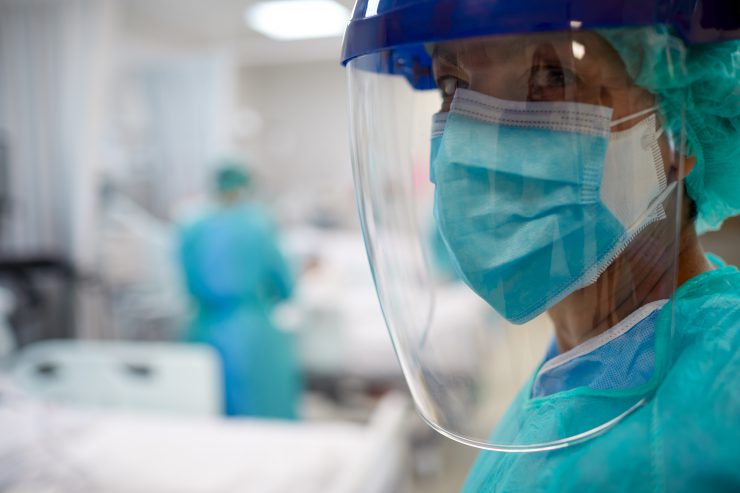The Regional Response Health Collaborative Program (RRHCP) launched in Pennsylvania in July 2020. It is a collaboration between:
- The Pennsylvania Department of Human Services
- The Pennsylvania Department of Health
- The Pennsylvania Emergency Management Agency
- 11 health care systems across Pennsylvania, including UPMC
The purpose of the program is to support the state’s long-term care system by offering COVID-19 readiness and response services.
Since its launch, the program has successfully leveraged expertise and existing resources to provide 24/7 clinical, operational, and educational guidance and intervention to 127,000 residents in 2,000 long-term care facilities. The goal is to mitigate and prevent COVID-19 and other seasonal viruses, like the flu.
Never Miss a Beat!
Subscribe to Our HealthBeat Newsletter!
Thank you for subscribing!
You can now select the specific newsletters you'd like to receive.
You are already subscribed.
Subscribe to more newsletters in our email preference center.
Sorry, an error occurred. Please try again later.
Get Healthy Tips Sent to Your Phone!
How Does the Regional Response Health Collaborative Program Work?
Under the RRHCP, the state was divided into six regions:
- Northwest
- North central
- Northeast
- Southwest
- South central
- Southeast
The regional health collaborative, consisting of the 11 health systems, was responsible for making at least two on-site visits to each long-term care facility in their region. For example, UPMC Community Provider Services — in partnership with Allegheny Health Network, the Jewish Healthcare Foundation, and the Hospital Council of Western Pennsylvania — is responsible for the southwest region and part of the northwest region.
One of the two visits to each long-term care facility had to be an initial assessment. After that, the collaboration would help with implementing best practices in several areas, including:
- Infection control
- Implementing contact tracing programs
- Supporting clinical care through on-site and telemedicine services
- Providing remote monitoring and consultation with physicians
Why Is the RRHCP Important?
To put it simply, this collaborative approach saves lives.
Pennsylvania ranks third among U.S. states in percentage of total population age 85 and older. According to the Centers for Disease Control and Prevention (CDC), individuals 85 and older are 630 times more likely to die from COVID-19 than someone between the ages of 18 to 29. Without the RRHCP, residents of Pennsylvania’s long-term care facilities — already the most disproportionately affected population would be even more vulnerable to COVID-19.
Over the course of just four months, the RRHCP was assigned more than 8,000 missions. This occurs when a regional health collaborative engages with a long-term care facility or is called in to help with a concern. Missions can include:
- Infection prevention
- Testing
- Consultations
- Contract tracing
- Support with fitting personal protective equipment (PPE)
As of Oct. 29, 2020, the RRHCP has:
- Conducted over 275 rapid response team deployments to stabilize operations and staffing while ensuring continuity of care and safety among residents and their families during current or potential COVID-19 outbreaks.
- Received more than 1,100 calls and provided technical assistance through the 24/7 call centers.
- Delivered COVID-19 webinars that have reached nearly 5,800 participants.
If additional funding is not secured, this program will not continue past Dec. 30, 2020. We have asked members of the Pennsylvania congressional delegation to support our federal funding request.
Where UPMC Stands with the RRHCP
At UPMC, we strongly believe that what matters most is how we catch and respond to outbreaks when they occur.
“This collaborative program has been a crucial and essential partner to providing facility support, consultations, testing assistance, provision of personal protective equipment, and successful outbreak management services,” says David Nace, MD, chief medical officer, UPMC Senior Communities. “It really is a model program for the rest of the country.”
The RRHCP has strengthened our response at the state level and made local facilities better equipped to respond. Any expiration of this critical program will hinder our ability to be “flexible and live” in our response to outbreaks that may occur throughout the state.
It is often said that virus fatigue has settled in, but COVID-19 does not care about our fatigue. Although the RRHCP cannot stop COVID-19 altogether, it is undoubtedly making us better at fighting it. We cannot lose this resource.
Learn more about this critical program from the Pennsylvania Department of Human Services.
Editor's Note: This article was originally published on , and was last reviewed on .
About Government Advocacy
UPMC is a world-renowned health care provider and insurer headquartered in Pittsburgh, Pennsylvania. Learn about UPMC’s position on public health issues and gain a better understanding of the initiatives that advance the health care industry.
